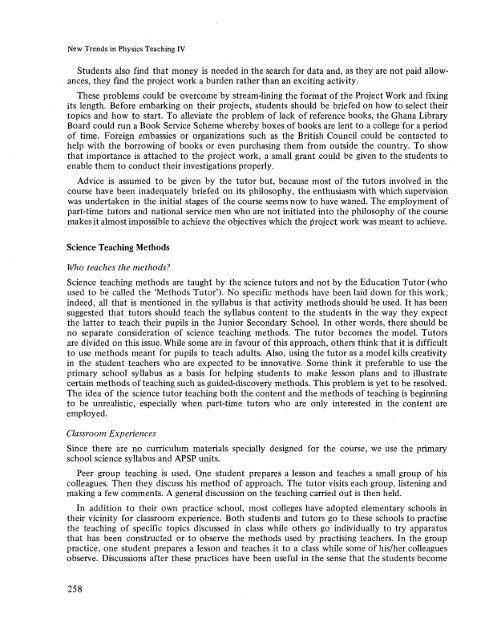New trends in physics teaching, v.4; The ... - unesdoc - Unesco
New trends in physics teaching, v.4; The ... - unesdoc - Unesco
New trends in physics teaching, v.4; The ... - unesdoc - Unesco
Create successful ePaper yourself
Turn your PDF publications into a flip-book with our unique Google optimized e-Paper software.
<strong>New</strong> Trends <strong>in</strong> Physics Teach<strong>in</strong>g IV<br />
Students also f<strong>in</strong>d that money is needed <strong>in</strong> the search for data and, as they are not paid allowances,<br />
they f<strong>in</strong>d the project work a burden rather than an excit<strong>in</strong>g activity.<br />
<strong>The</strong>se problems could be overcome by stream-l<strong>in</strong><strong>in</strong>g the format of the Project Work and fix<strong>in</strong>g<br />
its length. Before embark<strong>in</strong>g on their projects, students should be briefed on how to select their<br />
topics and how to start. To alleviate the problem of lack of reference books, the Ghana Library<br />
Board could run a Book Service Scheme whereby boxes of books are lent to a college for a period<br />
of time. Foreign embassies or organizations such as the British Council could be contacted to<br />
help with the borrow<strong>in</strong>g of books or even purchas<strong>in</strong>g them from outside the country. To show<br />
that importance is attached to the project work, a small grant could be given to the students to<br />
enable them to conduct their <strong>in</strong>vestigations properly.<br />
Advice is assumed to be given by the tutor but, because most of the tutors <strong>in</strong>volved <strong>in</strong> the<br />
course have been <strong>in</strong>adequately briefed on its philosophy, the enthusiasm with which supervision<br />
was undertaken <strong>in</strong> the <strong>in</strong>itial stages of the course seems now to have waned. <strong>The</strong> employment of<br />
part-time tutors and national service men who are not <strong>in</strong>itiated <strong>in</strong>to the philosophy of the course<br />
makes it almost impossible to achieve the objectives which the project work was meant to achieve.<br />
Science Teach<strong>in</strong>g Methods<br />
Who teaches the methods?<br />
Science teach<strong>in</strong>g methods are taught by the science tutors and not by the Education Tutor (who<br />
used to be called the ‘Methods Tutor’). No specific methods have been laid down for this work;<br />
<strong>in</strong>deed, all that is mentioned <strong>in</strong> the syllabus is that activity methods should be used. It has been<br />
suggested that tutors should teach the syllabus content to the students <strong>in</strong> the way they expect<br />
the latter to teach their pupils <strong>in</strong> the Junior Secondary School. In other words, there should be<br />
no separate consideration of science teach<strong>in</strong>g methods. <strong>The</strong> tutor becomes the model. Tutors<br />
are divided on this issue. While some are <strong>in</strong> favour of this approach, others th<strong>in</strong>k that it is difficult<br />
to use methods meant for pupils to teach adults. Also, us<strong>in</strong>g the tutor as a model kills creativity<br />
<strong>in</strong> the student teachers who are expected to be <strong>in</strong>novative. Some th<strong>in</strong>k it preferable to use the<br />
primary school syllabus as a basis for help<strong>in</strong>g students to make lesson plans and to illustrate<br />
certa<strong>in</strong> methods of teach<strong>in</strong>g such as guided-discovery methods. This problem is yet to be resolved.<br />
<strong>The</strong> idea of the science tutor teach<strong>in</strong>g both the content and the methods of teach<strong>in</strong>g is beg<strong>in</strong>n<strong>in</strong>g<br />
to be unrealistic, especially when part-time tutors who are only <strong>in</strong>terested <strong>in</strong> the content are<br />
employed.<br />
Classroom Experiences<br />
S<strong>in</strong>ce there are no curriculum materials specially designed for the course, we use the primary<br />
school science syllabus and APSP units.<br />
Peer group teach<strong>in</strong>g is used. One student prepares a lesson and teaches a small group of his<br />
colleagues. <strong>The</strong>n they discuss his method of approach. <strong>The</strong> tutor visits each group, listen<strong>in</strong>g and<br />
mak<strong>in</strong>g a few comments. A general discussion on the teach<strong>in</strong>g carried out is then held.<br />
In addition to their own practice school, most colleges have adopted elementary schools <strong>in</strong><br />
their vic<strong>in</strong>ity for classroom experience. Both students and tutors go to these schools to practise<br />
the teach<strong>in</strong>g of specific topics discussed <strong>in</strong> class while others go <strong>in</strong>dividually to try apparatus<br />
that has been constructed or to observe the methods used by practis<strong>in</strong>g teachers. In the group<br />
practice, one student prepares a lesson and teaches it to a class while some of his/her colleagues<br />
observe. Discussions after these practices have been useful <strong>in</strong> the sense that the students become<br />
258
















